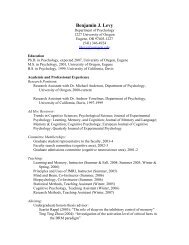930 Flegal and AndersonMean Number of Putts2520151050Higher SkillVerbalizationNo verbalizationLower SkillFigure 1. Test phase number of putts to reach criterion: Verbalizationdisrupts higher skill, but not lower skill, golfers’ putting.have differed noticeably across these groups (see Table 2).There were no reliable differences in length, nor in quantitativemeasures of readability or the number of putting stepsdescribed (determined by averaging counts from two independentraters, intraclass correlation of .94). Additionally,no significant differences across expertise level were foundin qualitative details, which were coded for (1) descriptionsof planning, execution, and outcome stages of putting(Beilock, Wierenga, & Carr, 2002) and (2) descriptions ofputt execution having an internal (e.g., bodily movements)or external (e.g., movement effects) locus of attention (Wulf,Lauterbach, & Toole, 1999; Wulf & Prinz, 2001). It is unclearwhy we failed to find expertise differences in verbalizationcontent akin to results from other paradigms (e.g.,Beilock, Wierenga, & Carr, 2002). Perhaps the higher skillgolfers in our study were not as experienced as the expertgolfers used in previous work.DiscussionIn the present experiment, we demonstrated that merelydescribing one’s <strong>skilled</strong> <strong>motor</strong> <strong>performance</strong> could impairthe execution of that skill later on. When higher skill golfersspent 5 min describing their recent putting experience,they took twice as many putts to reachieve the puttingcriterion on a later test than did control participants whospent 5 min performing an unrelated verbal activity. Incontrast, lower skill golfers were not measurably affectedby verbalization and, if anything, slightly benefited relativeto lower skill control participants. This difference betweenhigher and lower skill golfers appears unrelated tothe amount or type of verbalization content. Thus, verbaldescription by itself does not impair skill execution, unlessthe performer possesses a higher degree of proceduralizedknowledge. These results accord well with verbalovershadowing findings concerning episodic memory forperceptual experiences.Although prior work has documented the negative effectsof overthinking on <strong>motor</strong> <strong>performance</strong>, the presentTable 2Summary of Verbalization Content AnalysisHigherSkill LevelLowerSkill LevelM SD M SDLength of VerbalizationCharacters 701.0 146.9 683.9 155.9Word count 139.5 29.4 137.5 32.6Flesch Reading Ease 77.2 10.1 82.3 10.6Beilock, Wierenga, and Carr (2002) QuantitativeNumber of putting steps described 5.9 2.0 6.1 2.2Beilock, Wierenga, and Carr (2002) QualitativePlanning ContentCharacters 360.6 141.8 335.2 148.9Percent total 52 16 47 17Execution ContentCharacters 167.2 93.9 191.4 99.2Percent total 24 12 29 17Outcome ContentCharacters 105.3 77.8 91.7 78.3Percent total 14 9 14 13Nonprocess CommentaryCharacters 65.4 75.6 63.3 98.9Percent total 10 12 10 16Wulf: Internal/ExternalExecution contentInternal focus of attention (percent of verbalizations) 20 41 30 47External focus of attention (percent of verbalizations) 45 51 50 51Note—No significant differences between participants with higher versus lower skill level.
<strong>Overthinking</strong> Skilled Moto r Performance 931Anderson, J. R. (1982). Acquisition of a cognitive skill. PsychologicalReview, 89, 369-406.Baumeister, R. F. (1984). Choking under pressure: Self-consciousnessand paradoxical effects of incentives on skillful <strong>performance</strong>. Journalof Personality & Social Psychology, 46, 610-620.Beilock, S. L., & Carr, T. H. (2001). On the fragility of <strong>skilled</strong> perforstudyis the first to demonstrate that such effects occurafter thinking about <strong>performance</strong> offline. Whereas it mayseem intuitive that consciously reflecting on one’s skillduring execution would cause dual-task interference, it issurprising that simply describing one’s skill after the factcan be so disruptive. Indeed, our higher skill golfers werereduced to the <strong>performance</strong> level of our lower skill golfersafter verbalizing for only 5 min. The observation of suchoffline impairment suggests new interpretations of previouswork on dual-task interference in <strong>skilled</strong> <strong>performance</strong>,which previously would have been attributed to impairedexecution resulting from competition for shared processesor capacity. Although the present findings do not negatesuch factors, they indicate that something more enduringmay also occur: Conscious reflection may induce persistingchanges in access to the underlying representations.Indeed, the prediction that such persisting effects mightoccur followed by analogy from the many instances ofverbal overshadowing in episodic memory.What produces this enduring impairment? One possiblemechanism is global competition between modesof processing analogous to that proposed by the transferinappropriateprocessing hypothesis of verbal overshadowing(Schooler, 2002). In fact, research on learning systemsin animals and humans suggests such a hypothesis,indicating that the neural systems mediating proceduraland declarative learning competitively interact (Poldracket al., 2001; Poldrack & Packard, 2003). For example, lesionsto medial temporal lobe structures in animals improveprocedural learning. Similarly, functional neuroimagingstudies have shown that humans disengage medialtemporal lobe activity after practice on a skill-learningtask. If Poldrack and colleagues’ hypothesis is correct,vigorously engaging declarative memory (as in a 5-minperiod of intensive verbal retrieval and description) shouldtemporarily disrupt procedural learning systems. If so,the present effects may constitute the first behavioral evidencefor the competitive learning systems hypothesis inhumans. One intriguing prediction of this view is that verbaldescription should impair not only the described skill,but also other nondescribed skills acquired in the samesession, much as verbally describing a face impairs retentionof nondescribed faces (Dodson et al., 1997). Competitionbetween explicit and implicit learning systems hasalso been investigated in categorization tasks that requireintegration of information according to rules that are difficultto verbalize (Maddox & Ashby, 2004). Such differentialeffects of rule-based and procedural learning havebeen suggested to contribute to “choking under pressure”(Markman, Maddox, & Worthy, 2006), which offers an interestingaccount of evidence that stressful situations canincrease skill-focused attention in experienced athletes(Baumeister, 1984; Beilock & Carr, 2001; Gray, 2004).A second explanation for our results is a residual disruptiveeffect of skill-focused attention prior to task execution.Verbalization required participants to focus attentionon the elements of their <strong>skilled</strong> <strong>performance</strong>, similarto instructions to continuously monitor one componentof a golf putting or soccer dribbling task in the study byBeilock, Carr, et al. (2002). In our study, as in that one,attention to the component actions (as must occur duringthe act of verbalization) hurt <strong>skilled</strong> participants’ <strong>performance</strong>and modestly improved the <strong>performance</strong> of novices.Perhaps attending to the (verbalizable) componentsof a proceduralized skill induces enduring changes to theunderlying representation by decompiling it into its constituentparts, as proposed by Masters (1992). Alternatively,verbalization may not affect the procedural representation,but may instead induce a lingering attentionalbias toward the described components of the skill. Simplypaying more attention to what one has just described maycause online interference during the final test session,yielding results like those observed by Beilock, Carr,et al. (2002). We must emphasize, however, that attentionto the components of the skill by itself may not be enough;verbalizing memory for the action may be critical for impairinglater <strong>performance</strong>. In the verbal overshadowingdomain, related findings have shown, for example, thatmental imagery of a perceptual stimulus is not sufficientto produce verbal overshadowing, implicating verbal processingas integral to this kind of memory error (Fiore &Schooler, 2002; Schooler & Engstler-Schooler, 1990).Whatever the mechanistic basis, the present finding indicatesthat simply verbally expressing one’s recent <strong>motor</strong>action may sow the seeds of poor execution during later<strong>performance</strong>. This observation may have repercussionsfor athletes, who depend on effective mental techniques toprepare for their events (e.g., implicit learning in a gymnasticsroutine can be disrupted by verbalization, as shownby Brandimonte, Coluccia, & Baldanza, 2008). Equally,sports coaches and other physical activity instructors maywish to reconsider their opinions on strategies for impartingknowledge about <strong>motor</strong> control. Whereas verbalizationassists in the early stages of acquiring a skill, it may impedeprogress once an intermediate skill level is attained.To the extent that instructors themselves are <strong>skilled</strong> in whatthey teach, the recurring need to reflect upon and articulatethe basis of their skill may pose costs to their <strong>performance</strong>.Indeed, unless a concentrated effort is made to maintainone’s procedural expertise, the verbalization necessary forteaching may hasten a decline in skill, suggesting a newview of an old adage: Those who teach, cannot do.Author noteWe dedicate this article in memory of our friend and colleague SteveKeele, who advised on this project, and whose kindness and good spiritwill be sorely missed. We thank Brice Kuhl, Ben Levy, and Amanda Perezfor assistance with this project and Sian Beilock, Jonathan Schooler, andone anonymous reviewer for their valuable comments on the manuscript.Correspondence concerning this article should be addressed to K. E.Flegal, Department of Psychology, University of Michigan, 530 ChurchSt., Ann Arbor, MI 48109 (e-mail: kflegal@umich.edu).References




